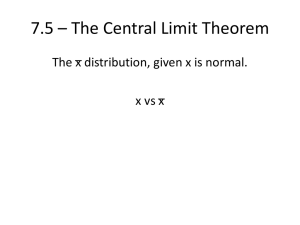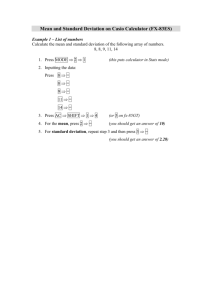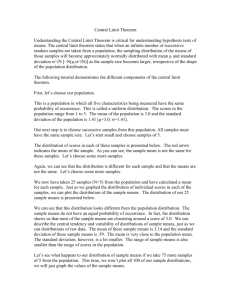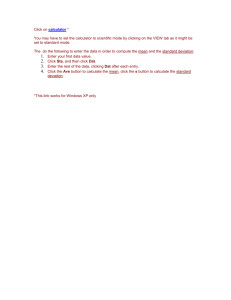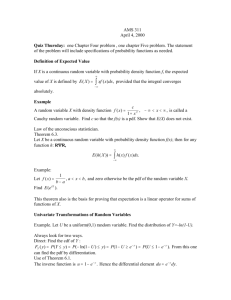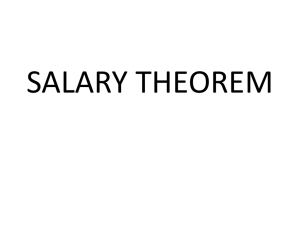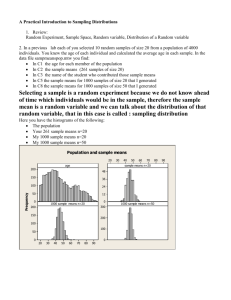Central Limit Theorem & Standard Error of Mean
advertisement
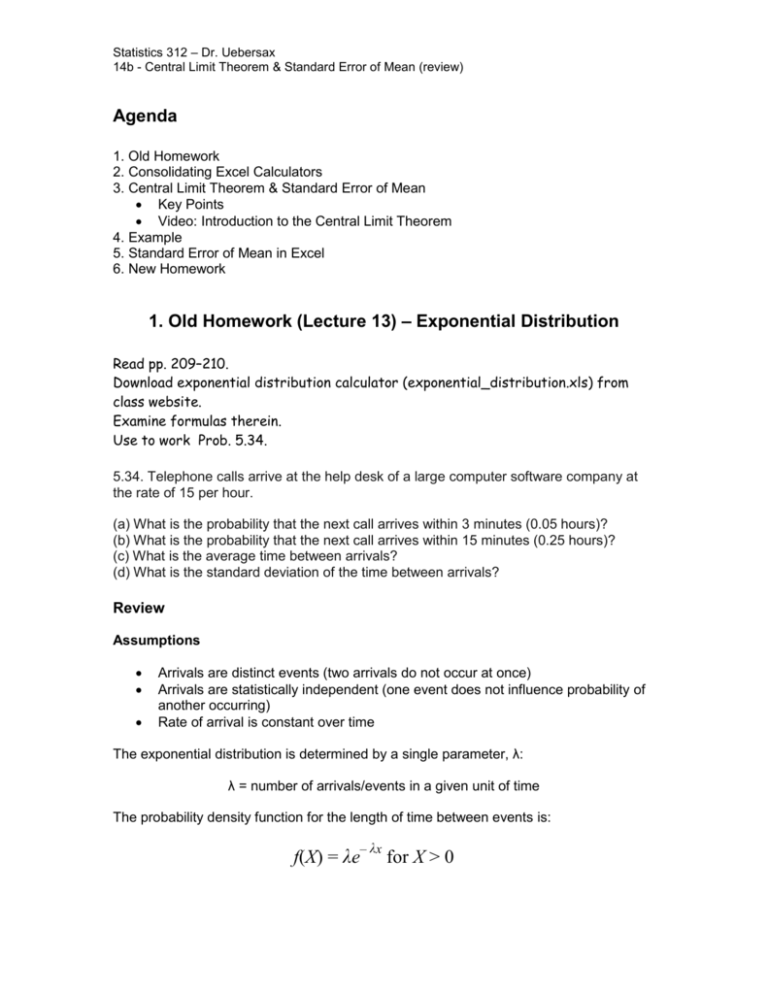
Statistics 312 – Dr. Uebersax 14b - Central Limit Theorem & Standard Error of Mean (review) Agenda 1. Old Homework 2. Consolidating Excel Calculators 3. Central Limit Theorem & Standard Error of Mean Key Points Video: Introduction to the Central Limit Theorem 4. Example 5. Standard Error of Mean in Excel 6. New Homework 1. Old Homework (Lecture 13) – Exponential Distribution Read pp. 209–210. Download exponential distribution calculator (exponential_distribution.xls) from class website. Examine formulas therein. Use to work Prob. 5.34. 5.34. Telephone calls arrive at the help desk of a large computer software company at the rate of 15 per hour. (a) What is the probability that the next call arrives within 3 minutes (0.05 hours)? (b) What is the probability that the next call arrives within 15 minutes (0.25 hours)? (c) What is the average time between arrivals? (d) What is the standard deviation of the time between arrivals? Review Assumptions Arrivals are distinct events (two arrivals do not occur at once) Arrivals are statistically independent (one event does not influence probability of another occurring) Rate of arrival is constant over time The exponential distribution is determined by a single parameter, λ: λ = number of arrivals/events in a given unit of time The probability density function for the length of time between events is: – λx f(X) = λe for X > 0 Statistics 312 – Dr. Uebersax 14b - Central Limit Theorem & Standard Error of Mean (review) The mean (average) time between events is: The standard deviation of time between events is: Cumulative probability: Pr(arrival time ≤ x) = 1 – e –λx Answers λ = 15 (calls per hour) x = 3 minutes = 3/60 = .05 hours . Exponential Distribution Calculator Statistic x lambda (arrival/failure rate) Pr (X =< x) Pr (X > x) mean time between arrivals/failures std. dev. Value 0.05 15.0000 0.528 0.472 0.067 0.067 (a) Probability next call arrives within 3 minutes = Pr(X ≤ 0.05) = 0.528 (c) Mean time between arrivals = 0.067 (d) Standard deviation of the time between arrivals = 0.067 (b) Probability next call arrives within 15 minutes (0.25 hours) = 0.976 Statistic x lambda (arrival/failure rate) Pr (X =< x) Value 0.25 15.0000 0.976 Statistics 312 – Dr. Uebersax 14b - Central Limit Theorem & Standard Error of Mean (review) 2. Demonstration: Consolidating Excel Calculators This demonstration shows how to consolidate our various individual Excel calculators into a single file with several worksheets. 3. Review: Central Limit Theorem & Standard Error of Mean Key Concepts Sampling. The repeated drawing of samples of some fixed size (n) from a population. Sampling distribution of the mean. The probability distribution describing the variability amongst all possible means of size n drawn from a given population. Standard error (of the mean). The standard deviation of the sampling distribution of the mean. Central limit theorem. Let X be a continuous variable with mean μx and standard deviation σx. Regardless of how X is distributed, the sampling distribution of the mean formed by taking all possible samples of a given size n will approximate a normal (Gaussian) distribution with mean and standard error of the mean X X / n as n increases. X X Statistics 312 – Dr. Uebersax 14b - Central Limit Theorem & Standard Error of Mean (review) Videos: jbstatistics playlists: https://www.youtube.com/user/jbstatistics/playlists Introduction to the Central Limit Theorem https://www.youtube.com/watch?v=Pujol1yC1_A Statistics 312 – Dr. Uebersax 14b - Central Limit Theorem & Standard Error of Mean (review) 4. Example Refer to jbstatistics video: Suppose salaries at a large corporation have a mean of $62,000 and a standard deviation of $32,000. If 1 employee is randomly selected, what is the probability that their average salary exceeds $66,000? Answer: We cannot answer this, because we do now know the shape of the parent distribution (see video). If 100 employees are randomly selected, what is the probability that their average salary exceeds $66,000? X X 62000 X X / n 32000 / 100 3200 z (X X) / X z = (66000 – 62000) / 3200 = 4000/3200 = 1.25 Cumulative Standard Normal Distribution (z-to-p) NORMSDIST() z 1.2500 p (-inf to z) 0.8944 Pr(z > 1.25) =1 – 0.8944 = 0.1056 Statistics 312 – Dr. Uebersax 14b - Central Limit Theorem & Standard Error of Mean (review) 5. Standard Error of the Mean in Excel In Lecture 8 you were asked to make an Excel calculator to compute sample/population variance and standard deviation. Add a new section to this spreadsheet to compute the standard error of the mean. That is, add to the existing calculator: Statistic Sample variance Population variance Sample standard deviation Population standard deviation Value =var(<range>) =varp(<range>) =stdev(<range>) =stdevp(<range>) the following two rows: Sample size Std. error of mean user supplied =stdev(<range>)/sqrt(<sample size>) where <range> is cells that contain raw data (e.g., a:a.) and <sample size> is the address (or name) of the cell where you have supplied the sample size. Note: The above corrects an error made in the classroom lecture. You must supply the sample size (i.e., do not use the population size) for the std. error. 6. New Homework Download Excel spreadsheet mpg.xls from class website. Suppose the data are mileage (miles per gallon) from a fleet of 89 utility vans. Treat as a population. For these data, calculate and report: 1. The population mean and population standard deviation. 2. The standard error of the mean for samples of n = 4. 3. The standard error of the mean for samples of n = 25. 4. Use your z-to-p calculator to compute the probability that the mean mpg of one random sample of 4 vans from this fleet would be greater than 26 mpg. For 1: Calculate using Excel (e.g., mystats.xls) For 2 and 3: Perform calculations manually (using results of 1); show work and formulas; check answers using Excel. For 4: Compute z manually (using results of 2) and show formula. Use z-to-p calculator to compute answer. It is strongly suggested you draw a picture.

